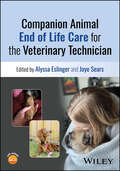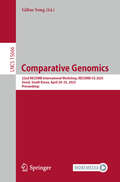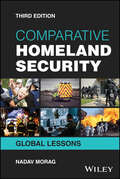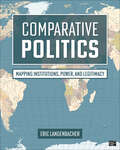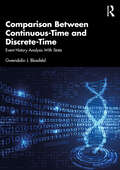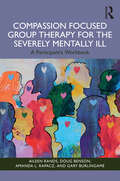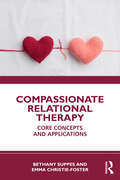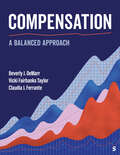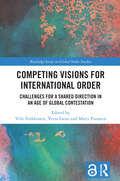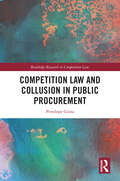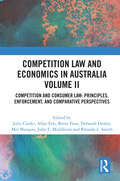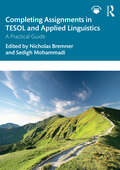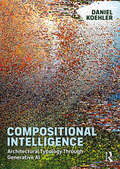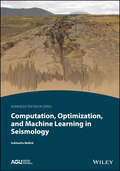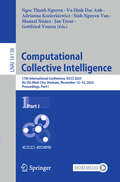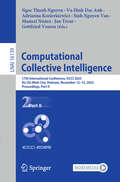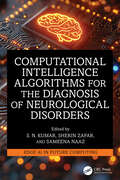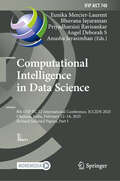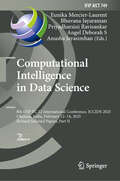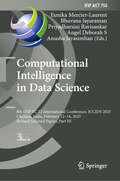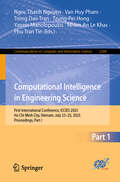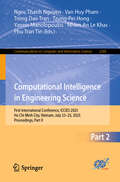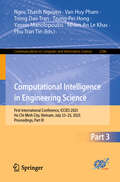- Table View
- List View
Companion Animal End of Life Care for the Veterinary Technician
by Alyssa Eslinger Joye SearsA practical, one-stop resource for veterinary technicians offering end-of-life services for companion animals In Companion Animal End of Life Care for the Veterinary Technician, an experienced interdisciplinary team delivers a comprehensive guide for veterinary technicians seeking a resource covering all aspects of the veterinary technician’s role in companion animal end-of-life care. The book explores everything from palliative nursing strategies to euthanasia techniques, with special attention to supporting and communicating with caregivers throughout the end-of-life period. The editors offer invaluable support, knowledge, and skills to enhance your ability to provide patients with comfort and offer empathy to caregivers in challenging situations. In this book, you will find a practical approach and user-friendly format, a handy and accessible reference for daily veterinary practice. you will also discover: Hospice and palliative care principles, philosophy, and methods of deliveryA thorough exploration of quality of life and end-of-life decision-makingPractical communication skills and case study applicationsEuthanasia best practicesThe valuable role of veterinary social work and perspectives on pet loss supportGrounded approaches to maintain technician and team wellbeingCareful alignment with evolving standards of end-of-life care and client expectationsDistillations of expert insights from authoritative texts and current literature, providing access to the most relevant information for technicians in the field of end-of-life care Perfect for practicing veterinary technicians with a desire to improve their standard of end-of-life care, Companion Animal End of Life Care for the Veterinary Technician will also benefit students of veterinary technology start their careers with the mindset and tools to lean into the meaningful experiences that can be accessed through compassionate end-of-life care.
Comparative Genomics: 22nd RECOMB International Workshop, RECOMB-CG 2025, Seoul, South Korea, April 24–25, 2025, Proceedings (Lecture Notes in Computer Science #15666)
by Giltae SongThis book constitutes the proceedings of the 22nd International Conference on Comparative Genomics, RECOMB-CG 2025, which was held in Seoul, South Korea, during April 24–25, 2025. The 21 full papers presented in this book were carefully reviewed and selected from 27 submissions. The papers are divided into the following topical sections: Cancer Genomics; Homology and Reconciliation; Phylogenetics; Sequence Analysis; Epidemiology and Genome Evolution.
Comparative Homeland Security: Global Lessons
by Nadav MoragProvides practical, globally informed solutions for a stronger U.S. homeland security framework Comparative Homeland Security: Global Lessons, Third Edition, offers critical insights into how democratic nations around the world approach homeland security (HS) threats. As the scope and complexity of HS challenges continue to expand—ranging from terrorism and public health crises to nation-state cyber operations and disinformation campaigns—this much-need book fills a crucial gap by systematically comparing international responses and offering lessons that can be adapted for the American context. Author Nadav Morag, an acknowledged expert with extensive experience both in the U.S. and internationally, structures the text around key functional areas within homeland security, such as counterterrorism, critical infrastructure protection, emergency management, and civil-military coordination. The third edition significantly updates previous material, integrating fresh analyses on grey zone threats and post-pandemic public health security strategies. New discussions on emerging threats, including cyber-enabled subversion of democratic institutions and infrastructure, provide timely frameworks for understanding modern hybrid warfare. Each chapter presents case studies from multiple democracies, including the UK, Israel, Canada, Australia, France, Germany, and Japan, emphasizing actionable strategies and institutional frameworks. This global perspective enables readers to critically assess the transferability of foreign approaches to enhance U.S. homeland security through informed, cross-national learning. Exploring how nations around the world address security challenges and what the U.S. can learn from their experiences, this book: Expands understanding of homeland security through comparative analysis of democratic nations’ policies and strategiesIncorporates up-to-date discussions of urgent threats including cyberattacks and disinformation operations Explores international public health preparedness and lessons learned from global responses to COVID-19Highlights critical infrastructure protection strategies from nations with diverse threat landscapesIncludes analysis of interagency coordination and civil-military relations in a global context Organized by thematic policy areas to enable quick reference to relevant case studies and strategic insights, this is essential reading for graduate-level students in homeland security, emergency management, criminal justice, and public policy programs, particularly in courses such as Comparative Homeland Security, International Security Policy, and Emergency Preparedness. Practitioners in government, defense, and civil security roles will find the book’s global perspective and practical applications a valuable resource in real-world practice.
Comparative Politics: Mapping Institutions, Power, and Legitimacy
by Eric A. Langenbacher"This book takes a new and interesting approach to introduce students to the foundations of comparative politics." —Marni Berg, Colorado State University Comparative Politics: Mapping Institutions, Power, and Legitimacy introduces students to the foundations of comparative politics while using mapping and data analysis to encourage them to think critically about ever-changing global relationships. Author Eric Langenbacher examines the key concepts of power and legitimacy through a variety of viewpoints, emphasizing the choices institutions make and why they make them. As students explore themes through world geography and data-based cases, they learn to reevaluate traditional ideas about national and other political borders and better assess the performance of political institutions.
Comparative Politics: Mapping Institutions, Power, and Legitimacy
by Eric A. Langenbacher"This book takes a new and interesting approach to introduce students to the foundations of comparative politics." —Marni Berg, Colorado State University Comparative Politics: Mapping Institutions, Power, and Legitimacy introduces students to the foundations of comparative politics while using mapping and data analysis to encourage them to think critically about ever-changing global relationships. Author Eric Langenbacher examines the key concepts of power and legitimacy through a variety of viewpoints, emphasizing the choices institutions make and why they make them. As students explore themes through world geography and data-based cases, they learn to reevaluate traditional ideas about national and other political borders and better assess the performance of political institutions.
Comparison Between Continuous-Time and Discrete-Time: Event History Analysis with Stata
by Gwendolin J. BlossfeldComparison Between Continuous-Time and Discrete-Time: Event History Analysis with Stata elucidates the statistical concepts and empirical applications of both continuous-time and discrete-time event history models. Empirical scientists have increasingly collected data on the timing of events, with the understanding that events can occur at any point in time and may be recorded using different observation schemes. However, time-continuous processes are not always observed with fine-grained temporal resolution; in some cases, they are captured with larger observation intervals (monthly, yearly, biennially, and quadrennially).This book introduces the need for discrete-time event history analysis methods and adeptly discusses the limitations of the discrete-time approach when compared to continuous-time models. It offers an in-depth comparison of both methods and sheds light on how they differ and align. By utilizing the statistical software Stata and using a campus example data set, the book provides practical examples that showcase the implications of larger observation intervals in discrete-time applications.This book serves as an essential resource for researchers, students, and practitioners seeking to comprehend the nuances of event history analysis in both continuous and discrete-time frameworks. Its comprehensive exploration of statistical techniques and real-world applications will equip readers with a deeper understanding of the strengths and limitations of each method, thus enabling more informed and robust decision-making in empirical research.
Compassion Focused Group Therapy for the Severely Mentally Ill: A Participant's Workbook
by Doug Benson Gary Burlingame Aileen Rands Amanda L. RapaczThis workbook should be used alongside A Clinician’s Guide to Compassion Focused Group Therapy for the Severely Mentally Ill to aid participants throughout their group journey in compassion focused therapy (CFT). CFT is a type of therapy aimed at understanding, alleviating, and preventing suffering in oneself and others.Divided into 12 modules, group members will move through the content with the support of their therapist. It is designed to be used during and between group sessions. Participants will be able to access and review key pieces of information. Additionally, participants will be able to engage with group material by completing handouts and applying CFT to their own life. Out of session practices can also be found inside, to further support patients in their growth.This is an ideal resource for patients in an inpatient setting, experiencing self-criticism and shame.
Compassionate Relational Therapy: Core Concepts and Applications
by Bethany Suppes Emma Christie-FosterWeaving together known successful interventions with innovative new methods, Compassionate Relational Therapy (CRT) offers a unique and cohesive method to strengthen relationships through decreased judgement and increased compassion within the self and with others.Integrating evidence-based practices of family systems theory, compassion-focused therapy, and mindful self-compassion, CRT reframes and expands existing approaches to better fit the needs of romantic and familial relationship therapy. This model examines interaction and communication patterns to unfold and release guilt and shame with compassion and nonjudgmental curiosity toward our assumptions or unmet needs. With applications for family therapy, romantic therapy, and sex therapy, readers will learn the skills to move toward self-kindness, situational and bodily mindfulness, and compassion toward a loved one’s humanness, to create a sense of relational safety and connection without dependence. This book includes CRT’s core theory of change, guides for all stages of treatment, and interventions unique to this model that can also be integrated into existing models of therapy. Additionally, it offers new interventions such as compassionate contextualization, temporary agreements, and compassionate restorations for work with diverse populations, with example cases and conversations in each chapter for easy application.Written in a compassionate and accessible style, this is an essential guide for mental health clinicians of all kinds and all experience levels, from students to seasoned professionals.
Compensation: A Balanced Approach
by Beverly J. DeMarr Vicki Taylor Claudia J. FerranteCompensation: A Balanced Approach 1e takes an applied approach to covering compensation systems and practices by balancing theory and research with exercises and applications. Each chapter looks at compensation from both the employer and employee perspective, giving students a more holistic understanding of the role total rewards play in an organization. Authors Beverly J. DeMarr, Vicki Fairbanks Taylor, and Claudia J. Ferrante help students develop the ability to think critically and ethically about compensation decisions and their effects on both employers and employees.
Compensation: A Balanced Approach
by Beverly J. DeMarr Vicki Taylor Claudia J. FerranteCompensation: A Balanced Approach 1e takes an applied approach to covering compensation systems and practices by balancing theory and research with exercises and applications. Each chapter looks at compensation from both the employer and employee perspective, giving students a more holistic understanding of the role total rewards play in an organization. Authors Beverly J. DeMarr, Vicki Fairbanks Taylor, and Claudia J. Ferrante help students develop the ability to think critically and ethically about compensation decisions and their effects on both employers and employees.
Competing Visions for International Order: Challenges for a Shared Direction in an Age of Global Contestation (Routledge Series on Global Order Studies)
by Ville Sinkkonen Veera Laine Matti PuranenThis book explores the international ordering visions of key global and regional powers in the international system from 2014 onwards.Using a fourfold analytical framework based on the distributional, normative, institutional, and temporal dimensions of the visions propagated by the relevant political elites in the states/actors in question, the book addresses the ultimate question in international relations for the coming decades: To what extent can the visions pushed forward by the leading powers of the world be reconciled to arrive at a shared direction for international order writ large? The book’s analysis also offers normative prescriptions on how to avoid a tragic race to the bottom – a fragmented world of competing orders where states are unable to address shared global crises and challenges such as pandemics, cross-border crime, climate tragedies, and armed conflict. With this, it concludes by recognising the importance of agency as well as political imagination in navigating the crisis-ridden ordering moment of the international system.This book will be of key interest to scholars and students in global order studies and governance, geopolitics, regional studies, foreign policy analysis as well as more broadly to international relations and security, political history, human geography, and policymakers.
Competition Law and Collusion in Public Procurement (Routledge Research in Competition Law)
by Penelope GiosaThis book examines infringements of competition law in public procurement settings, evaluating the latest European Procurement Directive 2014/24/EU to examine to what extent its provisions facilitate or deter collusion during specific award procedures.Public contracts account for a significant proportion of EU expenditure. In sectors such as energy, transport, social protection and the provision of health or education services, public authorities are the main purchasers. It is important to ensure that public contracts are awarded in an open, fair and transparent manner that enables domestic and non-domestic firms to compete on an equal basis, with the aim of improving the quality and lowering the price of purchases made by public authorities. This book assesses the competition law enforcement mechanisms that competition regulators bring to the area of public procurement in the attempt to deter bid rigging. It analyzes key tools for the public and private enforcement of competition law in the domain of public contracts, such as the leniency programme, damages claims for bid rigging and the whistle blower programme. The book uses auction theory as benchmark to assess the risk of collusion in the context of procurement procedures and techniques. Offering a holistic analysis informed by research, it makes recommendations for better design, set up and management of public tenders without distorting competition. Highlighting the need to make use of competition law enforcement mechanisms in the battle against collusion in public procurement, it identifies ways in which the procurement process can be improved, to reduce and prevent bid rigging.The book will be of interest to researchers in the field of competition law, public procurement and EU law.
Competition Law and Economics in Australia, Volume II: Competition and Consumer Law: Principles, Enforcement, and Comparative Perspectives
by Brent Fisse Mel Marquis Deborah Healey Julie Clarke Rhonda L. Smith Allan Fels John E. MiddletonMarking the 50th anniversary of modern statutory competition law in Australia, this two-volume set brings together more than 40 leading experts to discuss the most important issues and developments arising under Australian competition law, economics, and policy.This publication discusses current reforms and reviews the impact of competition law and consumer law in the Australian economy over the last 50 years, since the enactment of the Trade Practices Act 1974. Contributors examine the legacy of this landmark legislation, important precedents and cases that have shaped contemporary Australian competition law, as well as the substantive, procedural, and institutional features in need of revision. Volume I focuses on the history and context of Australian competition law, the courts and tribunal, and the competition system established by the Competition and Consumer Act. Volume II discusses key issues relating to consumer protection law, the digital economy, enforcement, remedies, and sanctions. It also considers the Australian competition regime from a comparative perspective. This volume, alongside its companion, The Competition Law System: Context, Law and Economics, is an authoritative treatise that will interest the broader competition law and policy community around the world. Together, they provide essential insights for academics, researchers, practitioners, consumer associations, policymakers, and regulators.
Completing Assignments in TESOL and Applied Linguistics: A Practical Guide
by Nicholas Bremner Sedigh MohammadiCompleting Assignments in TESOL and Applied Linguistics: A Practical Guide is an invaluable companion for anyone dealing with assignments in these fields.This hands-on guide walks students through every stage of assignment preparation, from unpacking assignment briefs and engaging in critical reading, to synthesising sources and developing academic writing. With clear, step-by-step guidance, each chapter addresses key skills while offering targeted support for specific assignment types, including: Critiquing a journal article, course, test or digital application Language analysis assignments Designing and justifying a lesson plan Reflective assignments Academic presentations Research proposals Contributions from educators and previous students worldwide provide balanced perspectives on tackling tasks that are enriched with real examples, feedback and reflective commentaries, as well as frequently asked questions. Designed to build confidence and competence, this accessible guide is essential for students aiming to succeed in TESOL, applied linguistics and related fields.
Compositional Intelligence: Architectural Typology through Generative AI
by Daniel Koehler*With a foreword by Mario Carpo*Given the extensive data sources represented by urban environments, this book investigates the potential of architecting for cities using large-scale models – the technological underpinning of Generative AI. Koehler examines Large Language Models (LLMs) in relation to architectural questions of typology – those critical junctures where architecture engages with the city itself. Typology becomes the interface between an AI model and its modeled audiences, represented languages, and scales of operation.The investigation reveals how LLMs represent a fundamental shift from comprehending discrete elements to understanding entire languages – introducing a stochastic perspective that transforms how we read and shape urban reality. At the heart of this framework lies the concept of “inductive types” – threshold interfaces that superpose multiple value regimes and actively reconfigure themselves in response to changing urban conditions. By treating architecture as a form of representational materialism rather than a fixed language, designers can engage with complex urban systems while maintaining critical agency.This approach envisions architecture as an embedding of languages, where buildings become processors of information that compute through their spatial arrangements. The synthetic knowledge produced by LLMs enables access to plural values and stakeholder perspectives, allowing architects to participate in broader material ecologies through computational superposition rather than traditional dialectical methods.Providing a robust theoretical framework as well as practical insights into how architects can adapt their notational tools and design processes to embrace AI, this will be an essential read for any practicing or researching architect or urban designer interested in the implications of AI on the built environment.
Computation, Optimization, and Machine Learning in Seismology (AGU Advanced Textbooks)
by Subhashis MallickA textbook applying fundamental seismology theories to the latest computational tools The goal of computational seismology is to digitally simulate seismic waves, create subsurface models, and match these models with observations to identify subsurface rock properties. With recent advances in computing technology, including machine learning, it is now possible to automate matching procedures and use waveform inversion or optimization to create large-scale models. Computation, Optimization, and Machine Learning in Seismology provides students with a detailed understanding of seismic wave theory, optimization theory, and how to use machine learning to interpret seismic data. Volume highlights include: Mathematical foundations and key equations for computational seismology Essential theories, including wave propagation and elastic wave theory Processing, mapping, and interpretation of prestack data Model-based optimization and artificial intelligence methods Applications for earthquakes, exploration seismology, depth imaging, and multi-objective geophysics problems Exercises applying the main concepts of each chapter
Computational Collective Intelligence: 17th International Conference, ICCCI 2025, Ho Chi Minh City, Vietnam, November 12–15, 2025, Proceedings, Part I (Lecture Notes in Computer Science #16138)
by Ngoc Thanh Nguyen Gottfried Vossen Manuel Núñez Jan Treur Adrianna Kozierkiewicz Vu Dinh Duc Anh Sinh Nguyen VanThis two-set volume LNAI 16138-16139 constitutes the refereed proceedings of the 17th International Conference on Computational Collective Intelligence, ICCCI 2025, held in Ho Chi Minh City, Vietnam, during November 12–15, 2025. The 67 revised full papers presented in these proceedings were carefully reviewed and selected from 290 submissions. The papers are organized in the following topical sections: Part I: Collective Intelligence and Collective Decision-Making; Co-operative Strategies for Decision-Making & Optimisation; Natural Language Processing; Knowledge Engineering & Industry 4.0 Applications; Data Mining & Machine Learning. Part II: Social Networks and Intelligent Systems; Cyber-Security, Blockchain & IoT; Computational Intelligence in Medical Applications; Computational Intelligence for Digital Content Understanding.
Computational Collective Intelligence: 17th International Conference, ICCCI 2025, Ho Chi Minh City, Vietnam, November 12–15, 2025, Proceedings, Part II (Lecture Notes in Computer Science #16139)
by Ngoc Thanh Nguyen Gottfried Vossen Manuel Núñez Jan Treur Adrianna Kozierkiewicz Vu Dinh Duc Anh Sinh Nguyen VanThis two-set volume LNAI 16138-16139 constitutes the refereed proceedings of the 17th International Conference on Computational Collective Intelligence, ICCCI 2025, held in Ho Chi Minh City, Vietnam, during November 12–15, 2025. The 67 revised full papers presented in these proceedings were carefully reviewed and selected from 290 submissions. The papers are organized in the following topical sections: Part I: Collective Intelligence and Collective Decision-Making; Co-operative Strategies for Decision-Making & Optimisation; Natural Language Processing; Knowledge Engineering & Industry 4.0 Applications; Data Mining & Machine Learning. Part II: Social Networks and Intelligent Systems; Cyber-Security, Blockchain & IoT; Computational Intelligence in Medical Applications; Computational Intelligence for Digital Content Understanding.
Computational Intelligence Algorithms for the Diagnosis of Neurological Disorders (Edge AI in Future Computing)
by Sherin Zafar S. N. Kumar Sameena NaazThis book delves into the transformative potential of artificial intelligence (AI) and machine learning (ML) as game-changers in diagnosing and managing neurodisorder conditions. It covers a wide array of methodologies, algorithms, and applications in depth.Computational Intelligence Algorithms for the Diagnosis of Neurological Disorders equips readers with a comprehensive understanding of how computational intelligence empowers healthcare professionals in the fight against neurodisorders. Through practical examples and clear explanations, it explores the diverse applications of these technologies, showcasing their ability to analyze complex medical data, identify subtle patterns, and contribute to the development of more accurate and efficient diagnostic tools. The authors delve into the exciting possibilities of AI-powered algorithms, exploring their ability to analyze various data sources like neuroimaging scans, genetic information, and cognitive assessments. They also examine the realm of ML for pattern recognition, enabling the identification of early disease markers and facilitating timely intervention. Finally, the authors also address the critical challenges of data privacy and security, emphasizing the need for robust ethical frameworks to safeguard sensitive patient information.This book aims to spark a conversation and foster collaboration among researchers, clinicians, and technologists, and will assist radiologists and neurologists in making precise diagnoses with enhanced accuracy.
Computational Intelligence in Data Science: 8th IFIP TC 12 International Conference, ICCIDS 2025, Chennai, India, February 12–14, 2025, Revised Selected Papers, Part I (IFIP Advances in Information and Communication Technology #748)
by Eunika Mercier-Laurent Bhuvana Jayaraman Priyadharsini Ravisankar Angel Deborah S. Anusha JayasimhanThe three-volume set IFIP ICCIDS 748, 749 and 750 constitutes the refereed post-conference proceedings of the 8th IFIP TC 12 International Conference on Computational Intelligence in Data Science, ICCIDS 2025, held in Chennai, India, during February 12–14, 2025. The 91 papers including 70 regular papers and 21 short papers included in these proceedings were carefully reviewed and selected from 317 submissions. The papers are organized in the following topical sections: Part I: Computer Vision for Real World Applications. Part II: Computer Vision for Real World Applications; Emerging Trends in AI for Speech and Text. Part III: Emerging Trends in AI for Speech and Text; Computational Intelligence for Secure, Smart and Sustainable Applications
Computational Intelligence in Data Science: 8th IFIP TC 12 International Conference, ICCIDS 2025, Chennai, India, February 12–14, 2025, Revised Selected Papers, Part II (IFIP Advances in Information and Communication Technology #749)
by Eunika Mercier-Laurent Bhuvana Jayaraman Priyadharsini Ravisankar Angel Deborah S. Anusha JayasimhanThe three-volume set IFIP ICCIDS 748, 749 and 750 constitutes the refereed post-conference proceedings of the 8th IFIP TC 12 International Conference on Computational Intelligence in Data Science, ICCIDS 2025, held in Chennai, India, during February 12–14, 2025. The 91 papers including 70 regular papers and 21 short papers included in these proceedings were carefully reviewed and selected from 317 submissions. The papers are organized in the following topical sections: Part I: Computer Vision for Real World Applications.Part II: Computer Vision for Real World Applications; Emerging Trends in AI for Speech and Text.Part III: Emerging Trends in AI for Speech and Text; Computational Intelligence for Secure, Smart and Sustainable Applications
Computational Intelligence in Data Science: 8th IFIP TC 12 International Conference, ICCIDS 2025, Chennai, India, February 12–14, 2025, Revised Selected Papers, Part III (IFIP Advances in Information and Communication Technology #750)
by Eunika Mercier-Laurent Bhuvana Jayaraman Priyadharsini Ravisankar Angel Deborah S. Anusha JayasimhanThe three-volume set IFIP ICCIDS 748, 749 and 750 constitutes the refereed post-conference proceedings of the 8th IFIP TC 12 International Conference on Computational Intelligence in Data Science, ICCIDS 2025, held in Chennai, India, during February 12–14, 2025. The 91 papers including 70 regular papers and 21 short papers included in these proceedings were carefully reviewed and selected from 317 submissions. The papers are organized in the following topical sections: Part I: Computer Vision for Real World Applications. Part II: Computer Vision for Real World Applications; Emerging Trends in AI for Speech and Text. Part III: Emerging Trends in AI for Speech and Text; Computational Intelligence for Secure, Smart and Sustainable Applications
Computational Intelligence in Engineering Science: First International Conference, ICCIES 2025, Ho Chi Minh City, Vietnam, July 23–25, 2025, Proceedings, Part I (Communications in Computer and Information Science #2584)
by Tzung-Pei Hong Ngoc Thanh Nguyen Yannis Manolopoulos Van Huy Pham Trong Dao Tran Nhien An Le Khac Phu Tran TinThis four-volume set constitutes the refereed proceedings of the First International Conference on on Computational Intelligence in Engineering Science, ICCIES 2025, in Ho Chi Minh City, Vietnam, during July 23–25, 2025. The 115 full papers presented in these proceedings were carefully reviewed and selected from 210 submissions. The papers are organized in the following topical sections: Part I: Machine Learning; Wireless Networks (6G)Part II: Computer Vision; Natural Language ProcessingPart III: Intelligent Systems; Internet of ThingsPart IV: Machine Learning; Control Systems
Computational Intelligence in Engineering Science: First International Conference, ICCIES 2025, Ho Chi Minh City, Vietnam, July 23–25, 2025, Proceedings, Part II (Communications in Computer and Information Science #2585)
by Tzung-Pei Hong Ngoc Thanh Nguyen Yannis Manolopoulos Van Huy Pham Trong Dao Tran Nhien An Le Khac Phu Tran TinThis four-volume set constitutes the refereed proceedings of the First International Conference on on Computational Intelligence in Engineering Science, ICCIES 2025, in Ho Chi Minh City, Vietnam, during July 23–25, 2025. The 115 full papers presented in these proceedings were carefully reviewed and selected from 210 submissions. The papers are organized in the following topical sections: Part I: Machine Learning; Wireless Networks (6G)Part II: Computer Vision; Natural Language ProcessingPart III: Intelligent Systems; Internet of ThingsPart IV: Machine Learning; Control Systems
Computational Intelligence in Engineering Science: First International Conference, ICCIES 2025, Ho Chi Minh City, Vietnam, July 23–25, 2025, Proceedings, Part III (Communications in Computer and Information Science #2586)
by Tzung-Pei Hong Ngoc Thanh Nguyen Yannis Manolopoulos Van Huy Pham Trong Dao Tran Nhien An Le Khac Phu Tran TinThis four-volume set constitutes the refereed proceedings of the First International Conference on on Computational Intelligence in Engineering Science, ICCIES 2025, in Ho Chi Minh City, Vietnam, during July 23–25, 2025. The 115 full papers presented in these proceedings were carefully reviewed and selected from 210 submissions. The papers are organized in the following topical sections: Part I: Machine Learning; Wireless Networks (6G)Part II: Computer Vision; Natural Language ProcessingPart III: Intelligent Systems; Internet of ThingsPart IV: Machine Learning; Control Systems
